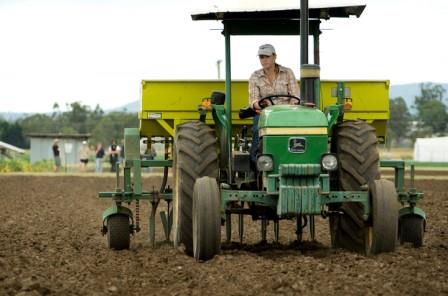UQ agriculture researchers say aluminium threat to food security revealed
One third of the world’s food-producing land has been lost in the past 40 years as a result of soil degradation, putting global food security at risk.
Researchers from the University of Queensland have discovered how aluminium (aluminum), a toxic result of soil acidification, acts to reduce plant growth.

UQ School of Agriculture and Food Sciences researcher Dr Peter Kopittke said the increasing human population and continuing degradation of farm soils has made food security a critical issue.
“Acid soils cost over $A1.5 billion per year in forgone production in Australia alone,” Dr Kopittke said.
“Soil degradation occurs naturally, but is exacerbated by agricultural activities and is expensive to reverse, so another option is to cultivate crops with better tolerance for the soil conditions.
“Our research has identified how aluminium reduces plant growth, so that we can work towards overcoming this and increasing crop productivity.”
The researchers discovered that aluminium in soils could reduce the growth of roots within five to 30 minutes of exposure.
Using the TwinMic microscope at the Elettra synchrotron facility in Trieste, Italy, they showed that aluminium accumulates in root tips, exerting a toxic effect on cells required for root growth.
“For these cells, growth occurs when the cell walls loosen, yet we demonstrated that aluminum accumulates in the cell wall and inhibits their growth,” Dr Kopittke said.
“If the roots of a plant don’t grow properly then it will be unable to access water and nutrients and it will not flourish.
“Low productivity crops do not make the best use of the available arable land, and make it difficult to keep up with global food demands.
“We have shown that in order to overcome the negative effects of aluminium, it is important to focus on traits involved in cell wall loosening to breed crops with greater aluminium tolerance.”
The research, conducted in collaboration with the University of Oxford, the University of South Australia and the Elettra synchrotron, is published in Plant Physiology.
UQ School of Agriculture and Food Sciences
The UQ School of Agriculture and Food Sciences provides study and practical experience covering several disciplines. Students are encouraged to participate in scientific activities not only as a component of their formal studies but also as a cooperative contribution to the life of the university and its surrounding community. Disciplines that have an environmental focus include agribusiness, agricultural science, and rural development.
About the UQ Master of Agricultural Science
The Master of Agricultural Science covers the integrative disciplines within the animal, plant, soil, food and social sciences continuum in 1.5 years. Select from one of four specialised fields of study to gain comprehensive theoretical and practical knowledge. Learn to apply your leadership, research and problem solving skills to meet the global challenges associated with feeding the world, and maintaining our environment in situations of increasing community expectations of animal welfare, biosecurity concerns, and competition for limited resources.
Studies may be undertaken in the following specialisations.
- Agronomy
- Animal Production
- Horticulture
- Plant Protection
Program: Master of Agricultural Science
Location: Gatton Campus, (Lockyer Valley; about a one-hour drive west of Brisbane)
Duration: 1.5 years
Semester intakes: February and July
Application deadline: May 31 (July intake); November 30 (February intake)
Apply to the University of Queensland!
*

































Ask A Question
Ask us about your program of interest, or if you have a question about our services.
CONTACT US TODAY